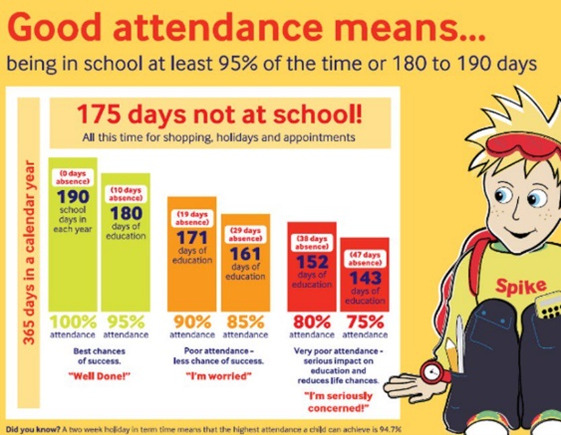Why is attendance important?
All children have the right to an education, so that they can gain important skills to prepare them for the future and increase their choices when they are older.
School can help you to:
- Learn important life skills.
- Make friends.
- Learn to work with others.
- Learn about the world.
- Pass important exams that you will need when you are older.
- Help you choose what you want to do when you are an adult.

Tips for good attendance
Good school attendance and punctuality will help you now to get the most out of school, and in the future for whatever you choose to do. These are a few tips to help you get to school each day on time:
- Preparation – get as much as you can ready the night before so that you feel prepared, and it takes away some of the pressure in the morning.
- Establish a good bedtime routine – make sure you are getting enough sleep so that you feel better in the morning, it is easy to get into routines that can actually make it harder to get up in the morning.
- Set an alarm – make sure you set an alarm to help you get up in the morning, if you know getting up is hard for you, ask a family member to support you and agree how
- Before bed is a good time to let your brain get some rest as well, taking a break from mobile phones and other devices it allows you to relax before going to sleep, improving the quality of your sleep.
- Allow time to travel to school – rushing can be very unsettling for you, and it may not help you to take on challenges that you may come across during the day.
Find someone to talk about your day with – talk about any worries or concerns you may have early on and about what you enjoyed or are looking forward to.
FAQs
We work with schools to help them improve the attendance of their pupils. Sometimes schools need specialist help. We offer attendance support which may involve working with families.
This often means closely working with other agencies. Our aim is to make a difference to the outcomes for children and young people by improving and sustaining regular school attendance.
If your parents have been invited to an attendance meeting, then they will have been contacted by one of our team to let you know why the meeting has been arranged and when and where it will take place. During the meeting we will discuss the reasons behind why the meeting has been called and aim to identify barriers affecting your school attendance.
Together with the school we will develop an action plan to help reduce the barriers and improve attendance at school. The action plan will be reviewed to see if it is working and what may need to happen next. If you are old enough, you will be invited to attend the meeting so we can hear how you feel and what your view is.
The school that you attend has sent in a request for a penalty notice to be issued because of an attendance issue. This will be because of one of two reasons. Either
- They have taken you out of school for an unauthorised holiday during term-time which has resulted in you missing ten sessions or more in a 6-week period. (Each school day has 2 sessions, one morning register and one afternoon register). Government guidance states that holidays can only be authorised in exceptional circumstances, and this is at the discretion of the school.
- That your attendance is concerningly low and is impacting on your education.
Support
Education support
Some children become worried when they have missed time off school about how difficult it may be to go back. To support you with your education BBC Bitesize has lots of information in their section Learn and Revise.
BBC Bitesize also has a study support section which can be found here.
Mental health support
We all have mental health animation is designed for young people aged 11-14 to help understand what we mean by mental health and how we can look after it and has been produced by the Anna Freud National Centre for Children and Families. Watch here
You can also explore the following services and links
Off The Record have a support line for young people. They also have a counselling service that provides a confidential space where you can explore your thoughts, feelings or experiences over a period of time with the support of a trained listener. It is a friendly and non-judgemental space in which you get to know and understand yourself better and make changes in your life.
Our Sutton counselling service is a free service for young people aged 11-25 in Sutton and you can contact them yourself for support. Click here for more information.
Kooth is an online mental wellbeing community for young people that have articles, personal journals and people that you can talk to in their team
Young Minds has practical advice and hep to find support for a range of topics affecting young people on their website.
BBC Bitesize has a section on their website for wellbeing and other support that has tips to help you through life’s challenges.
The Anna Freud National Centre for Children and Families has a section on its website for Young People called On My Mind. On My Mind aims to empower young people to make informed choices about their mental health and wellbeing.
Th Education Wellbeing Service has a YouTube channel with a range of information and guidance videos covering different topics for parents and young people of all ages.
To help you if you have concerns about going to school, Somerset County Council have guidance available for older children and young people.
